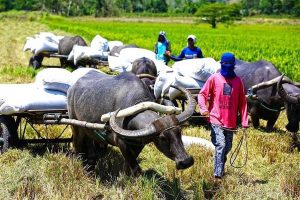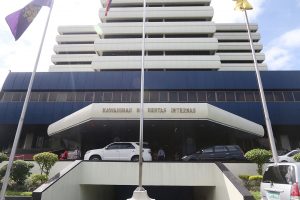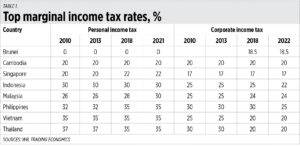Rice farmers receive P8.2 billion from DBP, LANDBANK since 2019

THE Department of Finance (DoF) said in a statement on Monday that state-run banks Development Bank of the Philippines (DBP) and Land Bank of the Philippines (LANDBANK) have disbursed P8.2 billion in cash aid to rice farmers as authorized by the Rice Tariffication Law.
Between 2019 and 2021, over one million qualified rice farmers tending small plots have received P5,000 in direct and unconditional cash aid, based on data from the Department of Agriculture (DA). Funds were distributed under the Rice Farmers Financial Assistance program of the DA, as provided for under the tariffication law.
“The Rice Tariffication Law has achieved its dual goal of bringing down retail rice prices while helping farmers improve productivity through the Rice Competitiveness Enhancement Fund,” Finance Secretary Carlos G. Dominguez III said.
The law, or Republic Act 11203, opened up the rice import market, with importers paying a 35% tariff on Southeast Asian grain. These tariffs provide the RCEF with P10 billion a year. President Rodrigo R. Duterte signed the law on Feb. 14, 2019.
Rice import tariffs in excess of the P10 billion set aside for the Rice Competitiveness Enhancement Fund (RCEF) must be used solely for financial assistance until 2024, with farmers eligible if they till 2 hectares (ha) or less.
During its first year of implementation in 2019, the Bureau of Customs (BoC) confirmed an excess of rice tariffs amounting to about P2.135 billion. This excess grew to P5.5 billion and P8.9 billion in 2020 and 2021, respectively.
Between March 2019 and 2021, the BoC collected P46.6 billion in rice import duties.
The DA estimates that since the implementation of RCEF, over one million rice farmers have received over 8.7 million bags of certified inbred rice seed, which have a higher yield than traditional seed.
Over 830,000 ha worked by rice farmers have seen improved yields, while close to a million farmers gained access to 19,542 units of farm machinery.
In addition, 90,000 farmers have also participated in nearly 5,000 training sessions, 14,459 specialists, trainers, and extension intermediaries have also received training on rice farming techniques.
As a result of the RCEF’s implementation, about 220 farm schools have been established, bringing the total to 470, while close to 50,000 rice farmers have accessed loans worth P1.5 billion from LANDBANK and the DBP.
The DoF said the excess funds generated by the tariffs was a reversal from the P11-billion average annual subsidy that the government provided to the National Food Authority, which had a monopoly on rice imports.
The law “has lowered prices of rice to an average of P39 per kilogram (kg) today or a reduction of about P7 per kilo compared to its cost in 2018 when it peaked to around P47 per kilo,” the DoF added.
Socioeconomic Planning Secretary Karl Kendrick T. Chua has earlier pushed for the continuation of the law by the next administration, saying that it was “the best model we have to help both farmers and consumers.” In 2021, he added, rice tariffs generated P18.9 billion, and went towards helping farmers. — Tobias Jared Tomas




